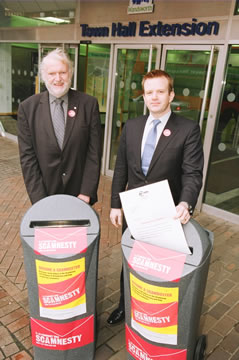Bin Those Scam Emails & Letters
Expose & combat hi-tech fraudsters
The council is supporting a campaign to expose and combat some of the scams that hi-tech fraudsters are using to swindle people out of their money.
The 'Scamnesty' campaign aims to draw attention to the style and nature of confidence tricks now being employed by thieves and con artists, and also to provide new leads for the police to follow up so that the fraudsters can be apprehended.
Every year across the UK an estimated three million people fall victim to mass marketed scams such as bogus lotteries, deceptive prize draws, competitions and sweepstakes. Many of these scams are sent by post, as well as by email or over the phone.
Typical of these new scams involve cases where people receive letters telling them they have won the Spanish lottery. Others are emails, purportedly from relatives of people in Africa who have died and left millions of dollars in bank accounts they want to transfer out of the country. Others involve emails from bogus banks and even from the taxman promising a rebate on your last tax return. All these scams are designed to get the victim's back account details and other sensitive information like addresses and dates of birth so that these accounts can be milked.
The council is now urging people who receive these letters to put them in special 'Scamnesty' bins that have been placed in public buildings like libraries, leisure centres and the town hall. All will then be passed onto the Met police's serious crime directorate, Wandsworth's trading standards team and also the Office of Fair Trading, who will all be looking to trace and then shut down the fraudsters' operations.
 |
The town hall's spokesman on community safety Cllr James Cousins said: "Some of these scams are very sophisticated and are carried out very professionally. Often people have no idea they are being conned for a very long time until they eventually find that their bank accounts have been cleaned out and all their savings are gone. "What we and out partners are attempting to do is raise awareness of this issue, and do all we can to warn people that if something seems to be too good to be true, there is a good reason for that – and so they should not be taken in by false promises of instant wins or instant wealth. |
| Cllrs Jim Madden & James Cousins with the Scamnesty bins | especially if you are being offered riches. Instead put the information in our 'Scamnesty' bins and drop the criminals in it." |
"We will make sure that all that information is passed onto the police and other agencies so that the criminals can be traced and put out of business."
If you receive a letter or email and are not sure if it is genuine or bogus - do not respond to it - call the council's community safety unit instead on (020) 8871 6603. The 'Scamnesty' campaign runs until February 15, but staff in the community safety unit are happy to talk to people at any time if they think they may be being targeted by fraudsters or con artists.
For an idea of how devastating the consequences of these scams can be, visit www.thinkjessica.com - a website set up by the daughter of an elderly victim of this type of crime who lost her life savings of £50,000.
February 5, 2009
Related links
|